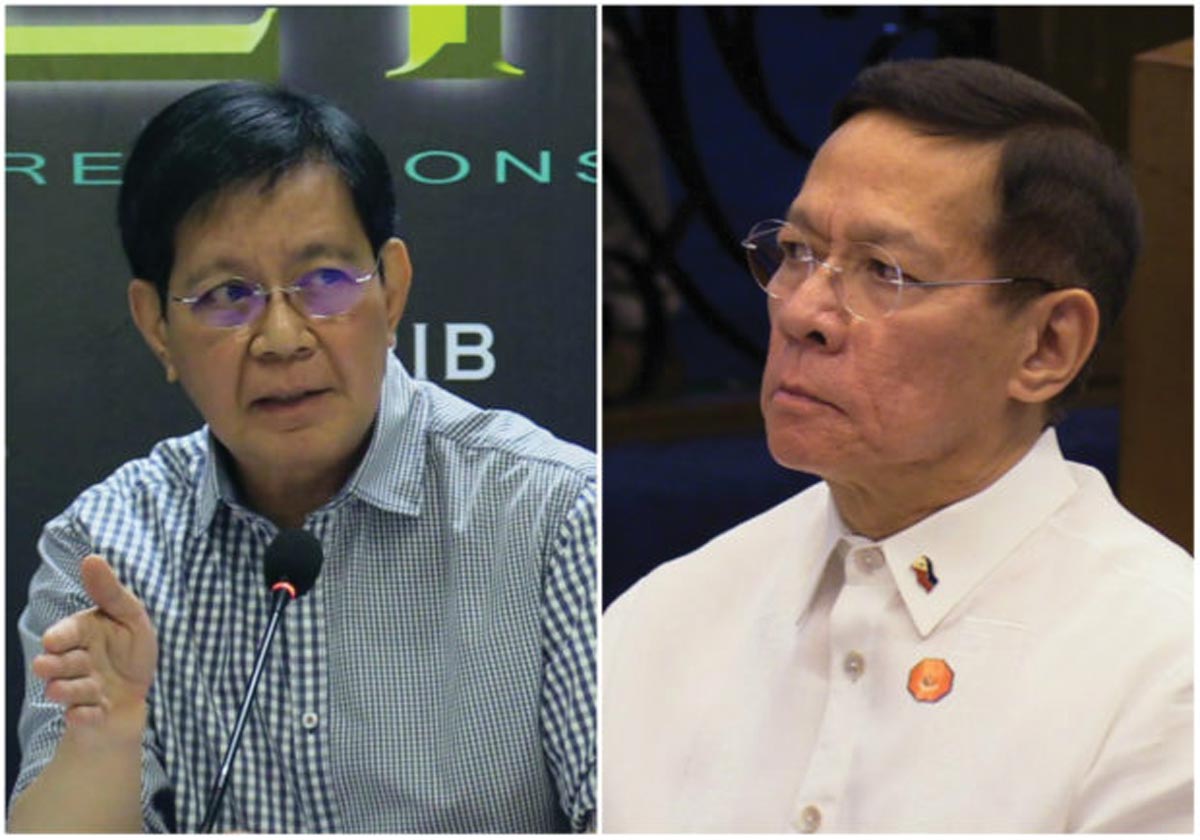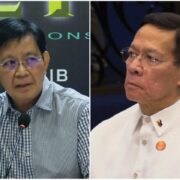
PHILIPPINE Senator Panfilo Lacson has named Health Secretary Francisco Duque III as the Cabinet member who “dropped the ball” in securing 10 million doses of Pfizer’s COVID-19 vaccine as early as January for the country.
“The negotiation between U.S. Secretary of State Mike Pompeo and [Foreign Secretary] Teodoro Locsin Jr. as arranged by [Philippine Ambassador to the United States Jose Manuel “Babe” Romualdez] started as early as July,” he said Wednesday night, December 16, in a series of text messages sent to reporters.
“Thus, they could have secured the delivery of 10 million Pfizer vaccines as early as January next year, way ahead of Singapore but for the indifference of Secretary Duque who failed to work on the necessary documentary requirement, namely, the confidentiality disclosure agreement (CDA) as he should have done,” the senator added.
On Tuesday, Locsin disclosed that the Philippines was supposed to receive 10 million doses of Pfizer’s COVID-19 vaccine as early as January, but someone bungled the deal.
The purchase was supposed to be financed by the World Bank and the Asian Development Bank.
“That said my thanks just the same to US Sec of State Mike Pompeo we – Babe Romualdez and I – got 10 million doses of Pfizer financed by World Bank and ADB to be shipped thru FEDEX to Clark in January. But somebody dropped the ball,” Locsin tweeted.
Neither Locsin nor Romualdez named the individual in question, but Lacson, who was in communication with the Philippine envoy, hinted that it was a Cabinet member who “keeps dropping the ball” but stays in the game because “the coach refuses to replace him.”
Duque, for his part, insisted that no one dropped the ball on the Pfizer deal.
“First of all, there is no such thing as dropping the ball. The negotiations are ongoing,” the health chief said Wednesday.
However, Lacson pointed out that Duque’s statement was not the whole truth.
“[But the] negotiation, according to Ambassador Romualdez, is a renewed initiative after they missed the bus the first time,” he said.
“The more important question is, how many lives would be saved between January and when [if at all] the vaccines may be made available again to Filipinos,” Lacson said.
Prudent and cautious
In response to Lacson’s accusations, Duque denied that he cost the country’s early access to Pfizer’s COVID-19 vaccine.
“I have the chronology of events so that this is all documented and there is no such a thing that I did not act quick enough,” he said on Thursday, December 17 in an interview over ABS-CBN News Channel.
“The thing is you go through a process, and when you go through a process, you cannot just be hurrying up things just like that. You have to be prudent and cautious especially because you are talking about a brand new, novel vaccine at that,” he added.
According to Duque, Pfizer sent an overview of their proposal on June 24. The Philippine Department of Health (DOH) on June 29 referred the proposal to the Department of Science and Technology-Philippine Council for Health Research and Development (DOST-PCHRD), which is the lead agency for the evaluation of COVID-19 vaccines.
On August 6, the DOH told Pfizer in a letter that its vaccine has to go under the evaluation of the DOST. The next day, the health agency met with the pharmaceutical firm to discuss the new mRNA technology it used in producing the vaccine.
On August 11, Pfizer sent its CDA draft, which was initially meant to be signed by Executive Secretary Salvador Medialdea.
“As a medical professional, my overriding principle in my practice of medicine is always to err on the side of caution, so I really needed to make sure that the concerned offices would clear the CDA document that was by the way only submitted [by Pfizer] on August 11,” said Duque.
“And up to that, that CDA was in fact intended to be signed per Pfizer request by the Office of the President, the Executive Secretary being the representative,” he added. “That would have spared Pfizer from signing a confidentiality agreement with many other government agencies, so isa na lang dapat (only one was required).”
However, the ES on September 24 informed the DOH that it would be the signatory to the CDA instead.
Duque signed the CDA on October 20, while the DOST and vaccine czar Secretary Carlito Galvez Jr. signed it in November.
No guarantee of 10M vaccine doses
Duque also clarified that there was no agreement that Pfizer would provide the country 10 million doses of its vaccine.
“No, walang ganoon (there was no such thing like that). It was all indicative numbers. There was no definitive supply,” he said.
“There was nothing binding. Nothing in our talks. So this was all open-ended, exploratory, and it was really meant to just get the data from Pfizer to know more about the safety profile of the vaccine, efficacy, result of the clinical phase 1 and 2 trials because at that time they are still not done with their clinical trials phase 3,” he added.
The health chief insisted that there was no definitive number guaranteed by Pfizer.
“The thing is I do not recall that na mayroong ganoong definitive, na, ‘ah makakakuha tayo ng (we will get) 10 million doses.’ There was nothing like that. Everything was indicative,” he said.
Palace: Locsin, Duque spat doesn’t matter
Malacañang, for its part, said that President Rodrigo Duterte doesn’t see any major lapse with Duque.
“I think from the overall demeanor of the President, he didn’t see any major lapse because we’re talking about a contract and he knows Secretary Duque is not a lawyer,” Presidential Spokesperson Harry Roque said in Filipino.
“And no damage occurred because we will still get the Pfizer vaccine,” he added.
Roque also pointed out that the deal with Pfizer to supply 10 million doses of its vaccine to the country was “impossible.”
“It looks like it would be impossible for us to really get Pfizer vaccines as of January because their January deliverables are completely paid for already by the rich countries,” he noted.
According to the spokesman, the conflict between Locsin and Duque doesn’t affect the country’s procurement of the vaccine against COVID-19.
“They can all fight if they want. The President has made it clear: there is only one person in charge of getting the vaccine, it’s Secretary Galvez,” said Roque.
He added, “These conflicting opinions between Secretary Locsin and Secretary Duque in the end does not really matter because it’s Secretary Galvez who has full authority.”






